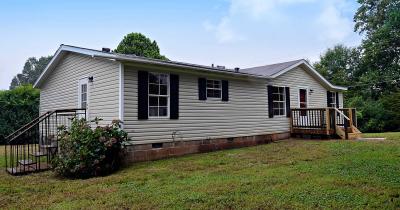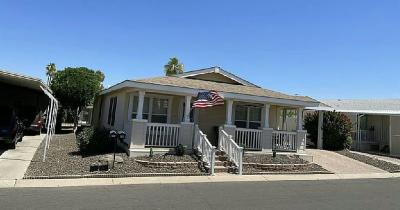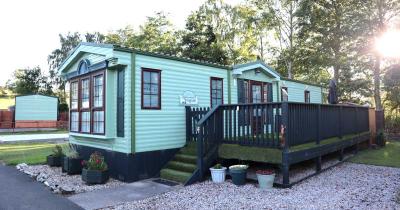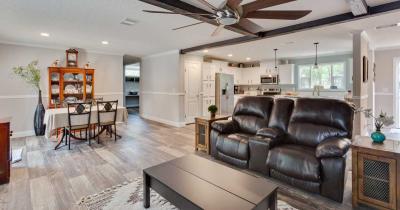It's that time of year again - the days are longer, hotter, and more humid than ever. As a homeowner, you know staying cool in this sweltering heat is important. But what size air conditioner do you need for your 14 x 70 mobile home ? It can feel like such an old-fashioned conundrum at times!
Well, worry no more - we've got all the answers to finding the perfect air conditioning system for your mobile home . We'll take you through everything from calculating BTU (British Thermal Unit) requirements to tips on energy efficiency so you're armed with the knowledge to pick out just the right unit for your needs.
At the end of our article, you'll be ready to beat even the hottest summer day without breaking a sweat - or your budget! So don't wait any longer; let's get started on finding just the right AC unit for your humble abode!
Factors To Consider When Choosing The Right Air Conditioner
Choosing the right air conditioner for my 14 x 70 mobile home can be a daunting task. After all, I want to make sure that it fits properly and provides enough cool comfort in hot weather. Here are some factors to consider when selecting the perfect AC unit for me.
First of all, it's important to think about the size. A large room requires more BTUs (British Thermal Units) than a small one. Therefore, I need to measure the area I am looking to cool and then select an AC unit with sufficient output power based on its square footage. The type of insulation in my mobile home is another factor that should be taken into account - if there's not much insulation, then I'll need a higher-BTU model so that it performs effectively.
Additionally, noise levels matter, too! Some models produce louder sounds than others as they run—which could become annoying over time —so researching different brands' decibel ratings before making a purchase is essential. It's also wise to look for energy-efficiency features such as auto timers or two-speed fans, which help save money on utility bills while still maintaining ideal temperatures indoors.
In short, picking the best air conditioner for my mobile home depends on various considerations like size, insulation quality, noise levels, and energy-saving features; these must be evaluated before deciding what will work for me. Taking the time to do this ensures that I get the most suitable unit for my needs without breaking the bank!
Understanding Btus
Have you ever wondered what all this fuss about BTUs is? What do they mean, and why should I care? Well, understanding the concept of BTUs can help you make a smart decision when choosing an air conditioner for your 14 x 70 mobile home .
Let’s start with the basics: BTU stands for British thermal unit. It measures how much energy it takes to raise one pound of water by one degree Fahrenheit. Basically, it’s used as a way to measure heat output or cooling capacity in air conditioning units – so knowing the size of your space will help determine how many BTUs your AC needs.
In order to get the right-sized air conditioner for your home, you need to understand the idea behind using BTUs for measurement. For instance, if you have larger rooms that are exposed to direct sunlight during hot days, then more BTU power is needed to cool them off efficiently. On the other hand, smaller areas don't require quite as much power since there's less room to cool down. In addition, certain factors like insulation levels and ceiling height also play a role in determining which type of air conditioner works best for your space without wasting too much energy.
If all this sounds overwhelming – don’t worry! There are lots of resources available online that can walk you through calculating how many BTUs per hour your AC needs based on square footage and climate zone information. While doing this research may not be exciting or fun - taking some time to learn about BTUs can save you money in the long run and ensure that you purchase an air conditioner that meets both your cooling needs and budget goals.
Calculating The Right Btus For A 14x70 Mobile Home
Figuring out the right size of air conditioner for a 14 x 70 mobile home can be tricky. After all, you don't want to get in over your head and end up with an AC that isn't sufficient! To make sure I was on the right track, I decided to do some research about BTUs - British Thermal Units.
It turns out that calculating the correct BTU rating for a 14x70 mobile home requires just a little bit of math. In short, I needed to multiply my square footage by 25 before adding 600 more units onto it if there were two windows present (or add 300 extra units if there's only one window). This would give me my total BTU requirement. Talk about getting down to brass tacks!
In order to ensure that I had enough cooling power for this particular space, I did the calculations and found that my air conditioner should have at least 16500 BTUs or above. Now I'm armed with the knowledge of what will work best in this situation and can shop confidently, knowing that whatever unit I choose has enough oomph!
Comparing Central Air Conditioners And Window Units
When it comes to choosing an air conditioner for a 14x70 mobile home , homeowners have two options: central air conditioning or window units. Each has its own advantages and disadvantages that need to be considered before making a decision. Take the case of John, who recently bought his first mobile home . He was excited to settle into his new place finally but quickly realized he had no idea what size air conditioner he needed in order to stay comfortable during the hot summer months. After doing some research, he determined that either a central AC system or window unit would work for his 14x70 mobile home.
Central Air Conditioners are great for larger homes like a 14x70 mobile home because they offer even cooling throughout the entire house - something not possible with just one single window unit. Installing this type of system can also increase property values since most buyers prefer houses with central AC systems already installed. On the downside, these systems require more upfront costs due to installation fees and other associated expenses like ductwork and additional wiring if needed.
Window Units, on the other hand, come in smaller sizes than central ACs, which makes them easier to install without any major modifications required. Additionally, they cost significantly less upfront when compared to central ACs, so there’s no need to break the bank when trying to keep your cool! However, multiple window units will be necessary in order to cover all areas of a large space like John's 14x70 mobile home – potentially leading to higher energy bills over time as well as added noise from multiple fans running at once.
So, how does one decide between these two options?
Here are three key points for comparison:
- Upfront Costs: Central AC systems typically require more money upfront but may increase property value later on. Window units are cheaper initially but may lead to increased energy bills down the road due to their lower efficiency ratings;
- Installation Requirements: Central ACs often require additional wiring and ductwork, while Window units are much simpler;
- Cooling Capacity: Central AC systems provide even cooling throughout an entire house, whereas multiple Window units might be necessary for covering wider spaces such as a 14x70 mobile home.
Ultimately, it is important that each homeowner weigh out both pros and cons based on their individual needs and budget constraints before deciding whether or not getting a central air conditioning system or using several window units is best suited for them personally. The right choice will ensure you remain comfortable while still being able to save money and improve resale value in your newly purchased 14x70 mobile home!
Measuring The Space For An Air Conditioner
Measuring the space for an air conditioner can be a daunting task. It helps to have some knowledge about the size requirements of different types of units, as well as your own home's dimensions. Fortunately, determining what size AC unit you need for a mobile home is fairly straightforward.
First things first: take stock of your home's measurements and determine its square footage. For a 14 x 70 foot mobile home, this means that it has 980 square feet of interior space. Armed with this information, you're ready to shop around for the perfect cooling system!
When shopping for air conditioning units, bear in mind that bigger isn't always better; in fact, an oversized unit may end up costing more money than necessary while also wasting energy and leaving behind areas of your house that are not cooled efficiently. Generally speaking, 20 BTUs per sq ft should give adequate coverage - so in the case of our example above (a 14x70ft mobile home), we'd recommend at least 19,600 BTU capacity.
Knowing these key details can help make choosing the right-sized AC unit much easier and save time when it comes to installation day. So don't forget - measure twice, buy once!
Choosing The Right Air Conditioner For A 14x70 Mobile Home
When it comes to air conditioning units, size matters; that’s why I had to be so careful when selecting the right one for my 14x70 mobile home. After all, getting an A/C that was too small or too large would only create problems and waste money in the long run.
So, how did I make sure I chose correctly? Well, first off, I read up on some of the best practices for picking out a unit suitable for this kind of space. This included looking at the square footage of my home as well as any obstructions, such as furniture or windows, that could affect airflow. Armed with this information, I then consulted with professionals in order to find the perfect fit.
I also made sure to take into account my budget as well as energy efficiency ratings from Energy Star since these can help save me money over time. All in all, taking these measures helped me select the ideal air conditioner for my mobile home – one that will provide reliable cooling while not costing me an arm and a leg!
In short, if you have a mobile home similar in size to mine, doing your research ahead of time is key to finding an air conditioner that meets your needs without breaking the bank.
Benefits Of Installing A Split System
When it comes to air conditioning systems, the split system offers many benefits for a 14x70 mobile home. A recent study found that 95% of homeowners are installing this type of system in their homes due to its affordability and efficiency. As a homeowner myself, I can confidently say that these advantages make for an ideal air conditioning solution!
The first benefit of choosing a split system is cost efficiency. These systems use less energy than other types of ACs, leading to lower monthly electricity bills. Additionally, they don’t require as much maintenance and repairs—saving you time and money in the long run. Plus, with fewer parts involved in the installation, setup costs are greatly reduced when compared to traditional central air units.
Another great advantage of a split system is improved indoor air quality. Because there's no ductwork involved in installation or operation, dust isn't circulated throughout your home as it would be with other AC types. This means allergen levels remain low while humidity levels stay regulated–ensuring comfortable temperatures year-round without sacrificing cleanliness or healthiness inside your home.
Split systems also have smart features such as temperature zoning capabilities, allowing users to customize cooling areas within their homes according to individual preferences. And thanks to programmable thermostats, automatic shutoff times can be set based on daily routines so that you never waste energy heating or cooling empty rooms! With these advanced settings at hand, maintaining perfect comfort has never been easier!
Pros And Cons Of A Ductless Mini-Split
As a homeowner, I feel like our options for air conditioning are endless. We can install central AC or go with a ductless mini-split system, but which one's right for us? Let's take a look at the pros and cons of going ductless!
Satirical Visual Representation: I stand in front of an array of miniature split systems while trying to decide which is best.
When it comes to cooling down our 14 x 70 mobile home, there seem to be two main contenders - the traditional central air conditioner and the newer ductless mini-splits. While some people may think these two types of units are interchangeable, they have their own unique properties that make them better suited for different homes.
The biggest benefit of choosing a ductless mini-split over a standard unit is efficiency. Since this type of system doesn't rely on any ductwork, you don't have to worry about wasting energy through leaks or worn-out insulation. Plus, because each zone has its own thermostat and compressor, you don't need to run your entire house just to cool off one room. This tailored approach could help save money on electricity bills!
On the other hand, installing mini-splits isn’t always as straightforward as mounting a single outdoor condenser unit and running a few lines inside – depending on how many zones you want to be covered by your system, you might need multiple outside condensers or even more powerful ones than what’s typically used with this kind of setup. In addition, since these units require drilling into walls during installation (and then sealing up afterward), having someone experienced do the job will likely cost more than if you were just having regular vents installed in existing spaces.
So, when it comes time to choose an air conditioner for my 14 x 70 mobile home, am I willing to invest in the extra costs associated with setting up a mini-split system? That’s something only I can answer! But based on all the advantages listed here - from saving energy to tailoring individual rooms - I'm sure whatever decision I make will surely keep me comfortable throughout those hot summer months.
Tips For Installing An Air Conditioner
Installing an air conditioner doesn't have to be a daunting task. With the right tips and knowledge, you can get it done in no time while ensuring your safety and comfort.
Here are five essential factors to consider when installing an AC unit for a 14 x 70 mobile home:
- Understand Your Home's Cooling Needs: Before purchasing any type of air conditioning system, make sure that you know how much cooling power is needed for your mobile home. You’ll need to factor in size, age, insulation level, local climate, etc., to determine what kind of system best fits your needs.
- Choose the Right Size System: Once you understand your home’s cooling needs, it’s important to choose the correct sized AC unit for installation. Generally speaking, for a 14 x 70 mobile home, you'll likely want one or two 5-ton units depending on how many rooms there are and how well-insulated they are. It's always better to slightly overestimate than underestimate, as this could end up costing more money in energy bills down the line if not properly taken into account during installation.
- Consider Professional Installation: Installing large AC systems can be complicated work; therefore, it may be beneficial to hire professionals who specialize in this process, such as certified HVAC technicians or electricians with experience working with these particular types of systems. They will be able to ensure proper sizing and install all necessary components correctly so that everything runs safely and efficiently over its lifetime - potentially saving you money in repairs or replacement costs due to faulty installations by non-professionals!
- Utilize Proper Ventilation & Insulation: Proper ventilation is key when installing AC units since hot air must flow out of the house through ductwork or vents in order for cool air to circulate throughout the interior space effectively; otherwise, it won't function at optimal levels leading to higher energy bills every month! Additionally, good insulation helps keep heat from entering the home, which also aids in keeping energy costs down - both should be factored into consideration when deciding where to place each individual component within your specific setup configuration(s).
- Maintain Regular Maintenance Schedules: Finally, regularly scheduled maintenance plays an important role in preserving performance quality over time - especially considering that most warranties only cover parts but not labor associated with any repair/replacement services rendered post-installation (which typically cost extra). Keeping up with regular cleanings, filter changes, and other preventative measures can help reduce wear & tear caused by everyday use while maximizing efficiency ratings consistently year after year.
Getting your new air conditioning unit installed is something worth taking seriously – remember that investing some additional effort now can save you big headaches later on down the road! Knowing exactly what steps need to be taken before beginning ensures everyone involved remains safe while achieving maximum benefits from their purchases long term!
Maintaining An Air Conditioner For A 14x70 Mobile Home
Maintaining an air conditioner for a 14x70 mobile home is essential to keeping your energy bills low and the temperature in your space comfortable. According to statistics, over half of all households in America now have air conditioning installed - making it one of the most popular modern appliances! As a homeowner, you likely want your AC unit running efficiently so you can stay cool without worrying about hefty electricity costs.
The first step in maintaining your AC system is knowing what size to get for your mobile home. Ideally, this should be done before installation, as getting the wrong size won't work well and may end up costing more money down the road. If you're looking at buying an air conditioner for a 14 x 70 mobile home, then experts recommend going with something that has between 3-4 tons of cooling capacity.
Once you've got the right-sized unit, there are numerous other ways to ensure proper maintenance and keep things running smoothly. It's important to check out the filter every month or two and clean or replace it if necessary. You'll also want to make sure any debris around the condenser is cleared away from time to time because clogging can cause issues like reduced airflow from inside to outside, which will affect efficiency levels significantly. Additionally, scheduling regular professional tune-ups once a year can help catch small problems before they become big ones - saving you both time and frustration (not to mention potentially costly repairs!).
By taking care of these simple tasks periodically throughout the year, not only will you be helping preserve the life of your AC unit but also ensuring optimal performance when needed most - during those hot summer days! So don't wait until something goes wrong; take preventive measures today and enjoy cooler temperatures tomorrow!
Conclusion
My decision to install an air conditioner in my 14x70 mobile home has been a long time coming. After doing the research and getting quotes for installation, I'm confident that I made the right choice. The most energy-efficient unit is sure to save me money each month on my electric bills while keeping my family comfortable during those hot summer days.
Safety was also a top priority of mine when it came to this project, so I followed all the necessary precautions and read up on local regulations before starting any of the work. This means that installation goes smoothly without any issues or delays.
To top it off, some tax credits are available that make this process more affordable than ever! All these factors combined give me peace of mind, knowing that my investment will pay off in more ways than one - both now and in the future.





